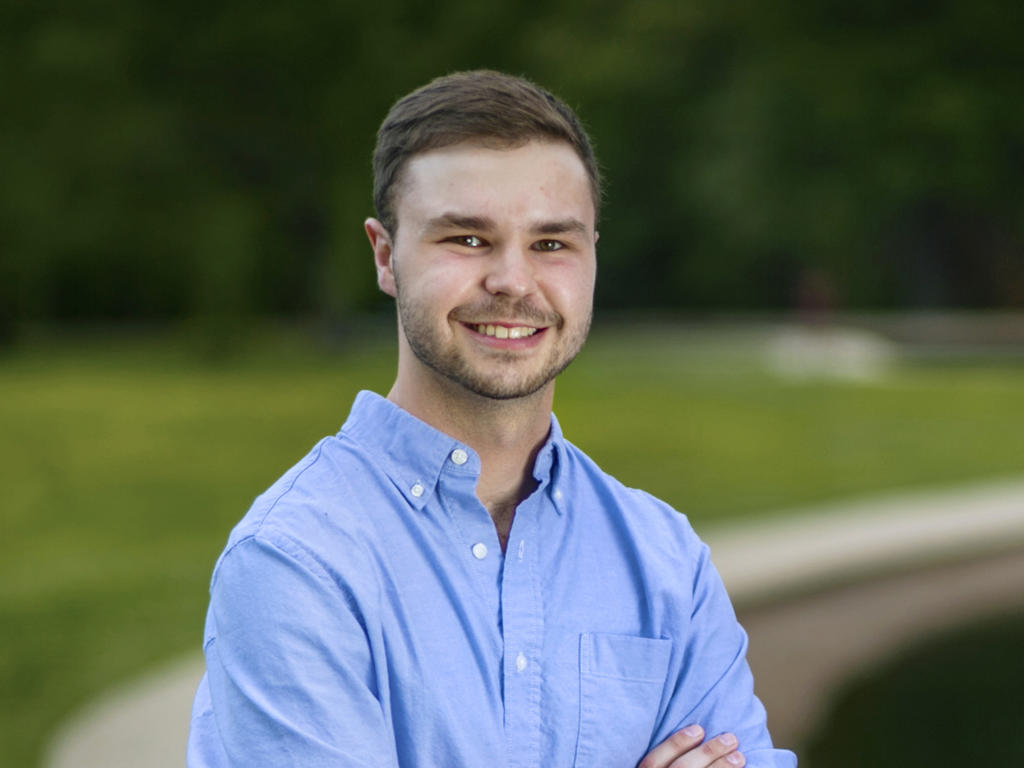Hometown: Chapel Hill, TN
Major: History
Extracurriculars: Bonner Scholar, Honor Council, “Lynx Club” Special Olympics Activities Coordinator, Research Assistant for Dr. Tim Huebner’s newest book, Search Advisory Council, Phi Alpha Theta History Honors Society, Hunger and Homelessness Issue Based Team
For history major Brooks Lamb ’17, an internship with the Overton Park Conservancy was a natural fit. “Being raised on a farm, I’ve always loved being on the land,” says Brooks. “But moving to Memphis and living in a city for the first time made me realize how much natural land means to me. It was my initial homesickness that made me want to save the places that are most important to me. I first nurtured this passion through community gardens in Memphis and through an internship with the Land Trust for Tennessee, before partnering with Overton Park. This place is a natural oasis in the middle of a large metropolitan area, and I want to further the purpose of the park and make it even better than it already is.”
Brooks began interning with the Overton Park Conservancy in the fall of his sophomore year for his community learning agreement with the Bonner Program. His responsibilities included leading volunteer events, doing physical work like clean up and tree planting, and connecting community members and Rhodes students with service opportunities in the park.
But Brooks was also interested in creating a relationship between the park, local businesses, and the surrounding neighborhoods. “When I was talking with the staff about how to improve membership in the Conservancy, I thought about the Memphis community and what makes it thrive—things like supportive community members,” says Brooks. This led him to develop a new component of the Conservancy’s membership program called Park Perks, which gives park members discounts to businesses in the area. “This increases memberships for the Conservancy, which are a major part of its funding, and then the community members receive discounts and also frequent local businesses,” explains Brooks. “It’s a win, win, win!”
Brooks continued his internship with the Conservancy this past summer as a part of his Bonner Summer of Service. In addition to his intern duties, he worked on a major project that he himself envisioned: a book about Overton Park through the lens of personal histories. (See the abstract for Our Park: Overton Park’s History Told by Those Who Lived It below.) “This summer, I spent the majority of my time meeting and interviewing people who have had a unique relationship with the park,” he explains. “The project has gone incredibly well, and I was able to speak with people who have diverse connections to the park, from an African American woman who helped desegregate the Levitt Shell through a sit-in to the attorney that stopped Interstate 40 from destroying the park.” He will soon begin to craft a narrative for each person’s story, and is excited to continue moving forward with the book. “I think it has the potential to make an impact that will benefit Memphians, Overton Park, and the values of land ethics.”
Finally, Brooks has plans to host lectures and panel discussions in the spring as a way to continue spreading awareness about the importance of taking care of natural places. In a blog post for Bonner, Brooks expressed his thoughts on the importance of place in this way: "The relationship between people and places is inseparable, unbreakable. No action ever occurs independent of a place; likewise, no place can be involved in a memory until people arrive . . . Places, like people, are important."
His work with the Overton Park Conservancy has also influenced his studies, sparking an interest in the field of environmental law. Looking to the future, Brooks says, “I hope to do something in the field of farmland conservation. I would like to continue my education and pursue a position dealing with land ethics and conservation.” And that sounds like a natural fit, too.
By Caroline Ponseti ‘15
Our Park: Overton Park’s History Told by Those Who Lived It
(Abstract)
Overton Park has been the heart of Memphis—both geographically and culturally—for over a century. With a thriving zoo, an old-growth forest, a concert venue, an art museum, and multiple playgrounds, the 342-acre park is a place of beauty and peace at the center of the city, a refuge whose history speaks to the changing political and cultural landscape of American life. These features make Overton Park an exciting place, but they are not what make the park special. The people of Memphis give Overton Park its character. A concert stage is only a slab of concrete without performers or fans; an old-growth forest sits unexplored until a curious mind wanders through; and a playground lingers as a pile of metal and wood until a child brings forward her imagination. It takes a people to make a park.
For this reason, Our Park explores the history of the park through people who have experienced it first-hand. Through conversations with a diverse group of Memphians, this book offers a personal history of the park itself, highlighting times of peace and conflict and the ways in which citizens responded to adversity to defend the park they loved. By sharing these moments in time, Our Park aims to tell the story of a park and its people.
